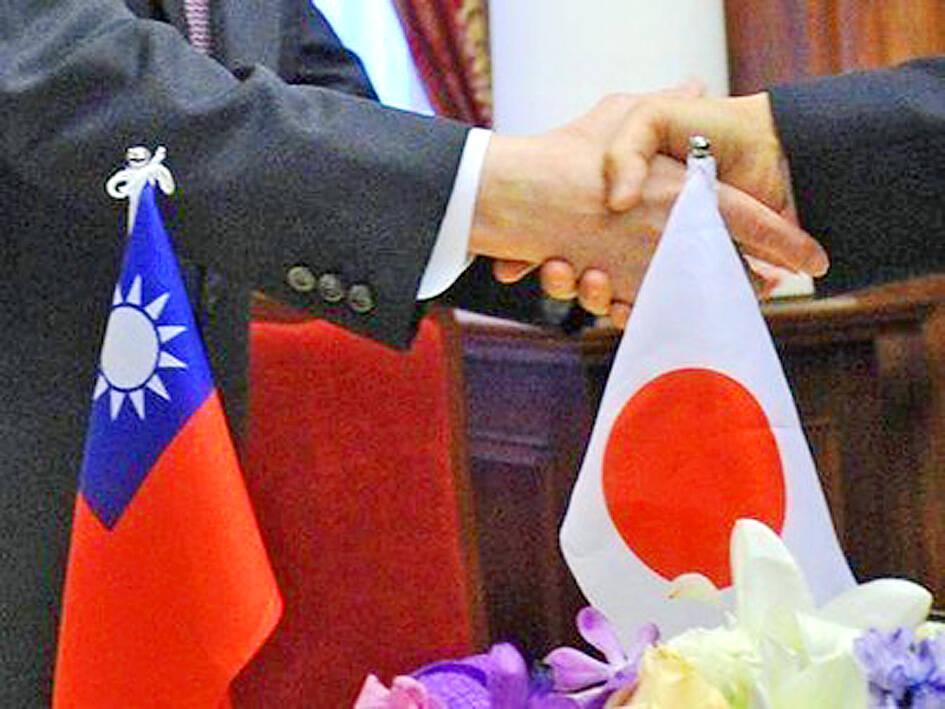Japan’s Ministry of Justice is to start allowing people to write “Taiwan” in the nationality field on household registration forms starting on May 26.
It is part of a change that would allow people to indicate a regional name alongside or in place of nationality, allowing Taiwanese who live in Japan to change their registration from “China” to “Taiwan.”
To register a household in Japan, it is necessary to be a Japanese citizen, the Japanese-language Nikkei reported.

Photo: CNA
Foreign spouses of Japanese citizens have their nationality recorded in the household registry, as do foreign-born individuals who later obtain Japanese nationality.
Regarding Taiwan and China, the issue of household registration dates to 1964, when the government had yet to establish diplomatic relations with the People’s Republic of China (PRC), Nikkei reported.
To avoid issues, the ministry decided to register people from both the PRC and Republic of China as “China” to avoid issues, the report said.
About 800 to 1,000 Taiwanese marry Japanese spouses annually, statistics from Taiwan’s Ministry of the Interior show.
This change brings the household registration document in line with Japanese resident cards for foreigners, which have allowed for people to list their regional identity since 2012.
It would also help the government better understand which foreign laws would apply in cases such as marriage, a ministry official said.
In Taipei, the Ministry of Foreign Affairs said that through the correct descriptions on Japanese family registers, the rights and interests of overseas Taiwanese in Japan would be further protected.
Minister of Foreign Affairs Lin Chia-lung (林佳龍) also expressed gratitude to the “long-term efforts made by various actors in Japan to address the issue of nationality descriptions on documents.”
As of the end of June last year, there were about 67,000 people from Taiwan living in Japan, the ninth-largest group among foreign residents.
The change also allows people to write “Palestine” as their place of origin.
The most recent changes do not mention Japan’s North Korean population, who still must use “Korea” in place of “North Korea.”
Additional reporting by Bloomberg

South Korean K-pop girl group Blackpink are to make Kaohsiung the first stop on their Asia tour when they perform at Kaohsiung National Stadium on Oct. 18 and 19, the event organizer said yesterday. The upcoming performances will also make Blackpink the first girl group ever to perform twice at the stadium. It will be the group’s third visit to Taiwan to stage a concert. The last time Blackpink held a concert in the city was in March 2023. Their first concert in Taiwan was on March 3, 2019, at NTSU Arena (Linkou Arena). The group’s 2022-2023 “Born Pink” tour set a

CPBL players, cheerleaders and officials pose at a news conference in Taipei yesterday announcing the upcoming All-Star Game. This year’s CPBL All-Star Weekend is to be held at the Taipei Dome on July 19 and 20.

The Taiwan High Court yesterday upheld a lower court’s decision that ruled in favor of former president Tsai Ing-wen (蔡英文) regarding the legitimacy of her doctoral degree. The issue surrounding Tsai’s academic credentials was raised by former political talk show host Dennis Peng (彭文正) in a Facebook post in June 2019, when Tsai was seeking re-election. Peng has repeatedly accused Tsai of never completing her doctoral dissertation to get a doctoral degree in law from the London School of Economics and Political Science (LSE) in 1984. He subsequently filed a declaratory action charging that

The Hualien Branch of the High Court today sentenced the main suspect in the 2021 fatal derailment of the Taroko Express to 12 years and six months in jail in the second trial of the suspect for his role in Taiwan’s deadliest train crash. Lee Yi-hsiang (李義祥), the driver of a crane truck that fell onto the tracks and which the the Taiwan Railways Administration's (TRA) train crashed into in an accident that killed 49 people and injured 200, was sentenced to seven years and 10 months in the first trial by the Hualien District Court in 2022. Hoa Van Hao, a